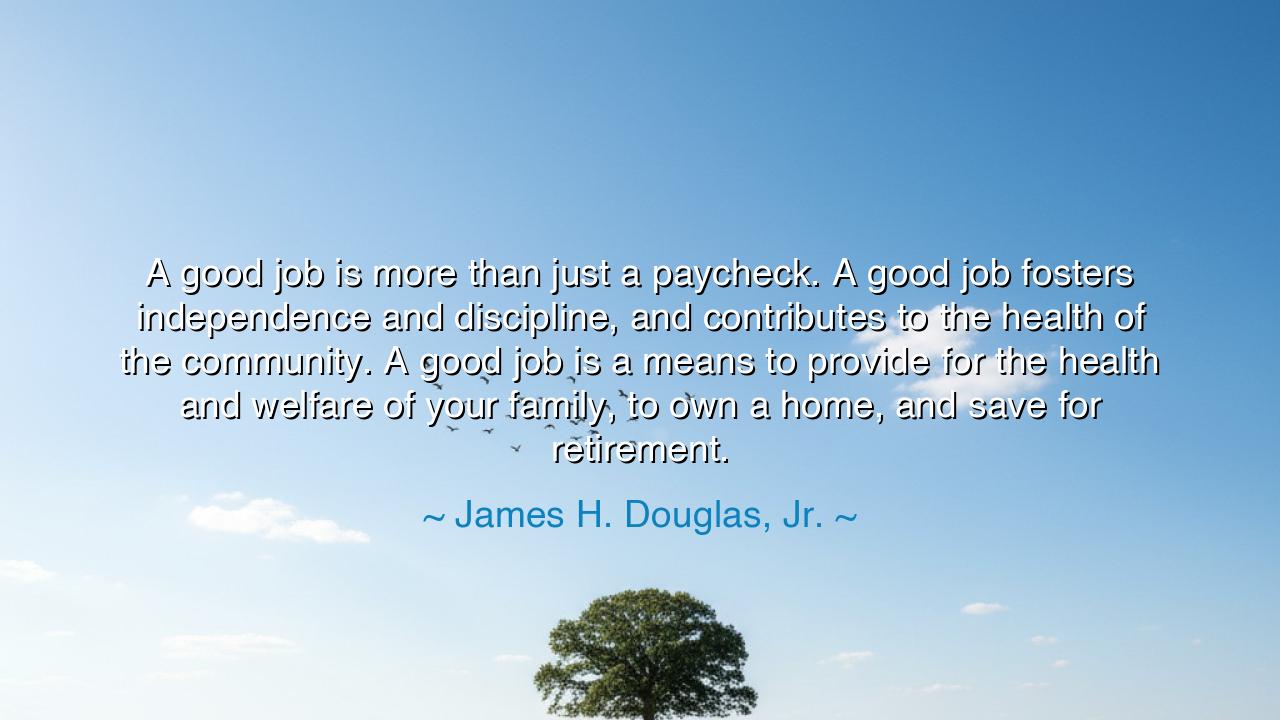
A good job is more than just a paycheck. A good job fosters
A good job is more than just a paycheck. A good job fosters independence and discipline, and contributes to the health of the community. A good job is a means to provide for the health and welfare of your family, to own a home, and save for retirement.






“A good job is more than just a paycheck. A good job fosters independence and discipline, and contributes to the health of the community. A good job is a means to provide for the health and welfare of your family, to own a home, and save for retirement.” Thus spoke James H. Douglas, Jr., a man who had seen both the trials of war and the challenges of peace, a leader who understood that work is not merely labor, but the very breath of a society’s soul. His words shine like a lantern in the long corridor of human struggle, reminding us that a good job is not measured in coin alone, but in character, in purpose, and in the unseen dignity it bestows upon those who hold it.
From the dawn of civilization, work has been the foundation upon which all greatness rests. The farmer who tills the soil, the craftsman who shapes the stone, the teacher who molds young minds — all share in the sacred duty of sustaining the world. Douglas’s words echo this eternal truth: that labor well done is both a personal triumph and a public service. It builds independence, for the man who earns his bread by his own hands is free. It builds discipline, for the one who works learns patience, endurance, and pride in effort. And it builds community, for every honest trade — however small — binds one life to another in the vast web of human need.
Consider the story of George Washington Carver, born into slavery, yet freed not by the mercy of others but by the power of his own work. He rose before dawn, studying by candlelight, tending the fields, and learning the mysteries of the soil. Through his labor, he transformed agriculture in the South, teaching farmers to restore the land with peanuts and sweet potatoes. But Carver’s true legacy was not in crops — it was in discipline and independence. His hands taught that a good job, done with devotion, nourishes the earth and the spirit alike. He proved that work, when rooted in purpose, becomes a form of freedom.
A society that honors work honors itself. When men and women take pride in their craft, when they labor not as slaves to necessity but as stewards of creation, the health of the community flourishes. Children grow in homes built by steady hands. Elders rest knowing they have left behind something enduring. The streets, the schools, the farms, and the shops — all are strengthened by those who see in their daily toil not mere survival, but the art of building a future. For in truth, the wealth of a nation is not in its gold, but in the honesty and purpose of its workers.
Douglas spoke also of the family, the sacred hearth of every civilization. A good job, he said, is the means to provide for the health and welfare of one’s loved ones — to offer not only bread, but dignity, safety, and hope. When a man can feed his children, when a mother can clothe her own, when the aged can rest knowing their labor will not leave their descendants destitute — then society stands upright, and peace dwells among its people. Thus, work becomes an act of love, a living prayer offered through sweat and perseverance.
Let us not forget, too, the virtue of saving, of building wisely for the years to come. To labor only for today is to walk blind into the storms of tomorrow. The wise worker, as Douglas counsels, uses his earnings to secure the home, the future, and the honor of self-reliance. For thrift is the companion of freedom; it shields the family from despair and teaches the next generation the power of foresight and restraint. Through saving, the fruit of labor becomes the seed of legacy.
So, my children of tomorrow, take heed of this teaching. Seek not the job that fills your purse, but the one that fills your spirit. Do your work as though you build a temple — brick by brick, task by task — knowing that every act of diligence strengthens the foundation of your life and the life of your people. Respect your craft, for through it you serve not only yourself, but the unseen harmony of your community.
And remember this final truth: a good job is not given — it is earned through honor, effort, and integrity. Work not merely to live, but to live well, to uplift others, and to leave behind a world richer in soul than when you entered it. For when each man labors with heart and purpose, the nation itself becomes a living monument — not of wealth, but of virtue, independence, and enduring strength.






AAdministratorAdministrator
Welcome, honored guests. Please leave a comment, we will respond soon